Top 10+ Best CRM for Startups to Drive Business Success in 2026
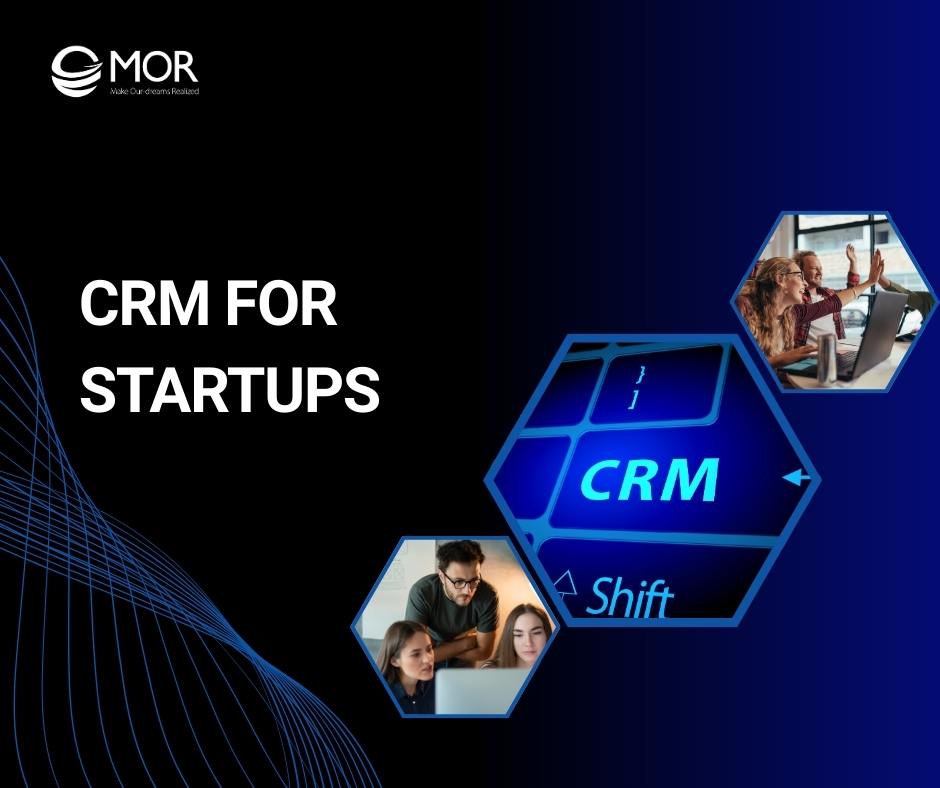
Choosing the right CRM for startups can be overwhelming when every decision impacts growth, customer relationships, and long-term success. Many founders struggle to find a solution that balances cost, scalability, and usability among countless CRM options for startups. This MOR Software’s guide will walk you through the top 10+ best platforms in 2026 and help you decide which CRM fits your business goals best.
What Is A CRM For Startups?
A CRM for startups is a centralized system that organizes customer information and equips your team with practical tools to take meaningful action. These capabilities often cover multiple functions such as sales tracking, customer support, marketing campaigns, online commerce, and even specialized fields like financial services or healthcare.
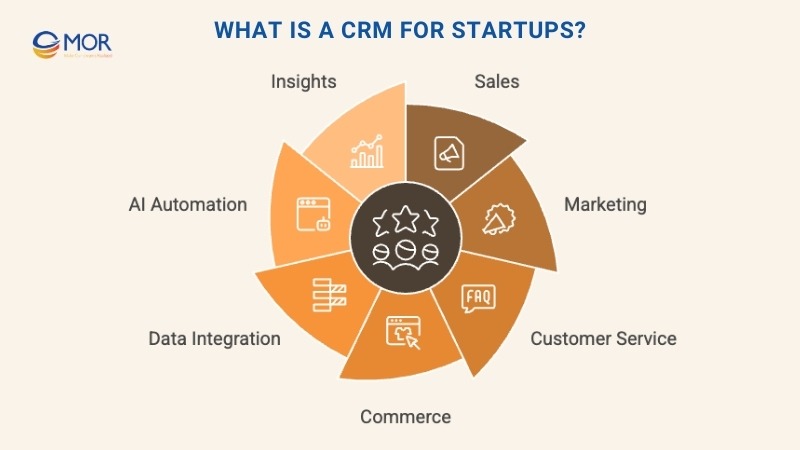
For CRM for startup companies, efficiency is everything. Early-stage teams usually wear many hats and need to make the most of limited resources. A well-chosen platform can transform how you operate, simplify complex tasks, and create smoother workflows that directly support growth.
Businesses today rely on these systems for several core activities, including:
- Identifying target audiences and launching marketing campaigns
- Gaining visibility into every sales deal and forecasting future revenues
- Providing immediate customer service on any channel
Modern startup CRM platforms also integrate data from different sources into a single view. Some of the best CRM systems now include built-in artificial intelligence (AI) that analyzes customer behavior, automates routine processes, and helps founders make faster, more informed decisions.
Key Benefits Of CRM For Startups
No matter if your startup is funded through crowdfunding, grants, business loans, or venture capital, laying the foundation for growth is essential. A CRM for startups provides the structure to achieve that, and here are five powerful ways it can help.
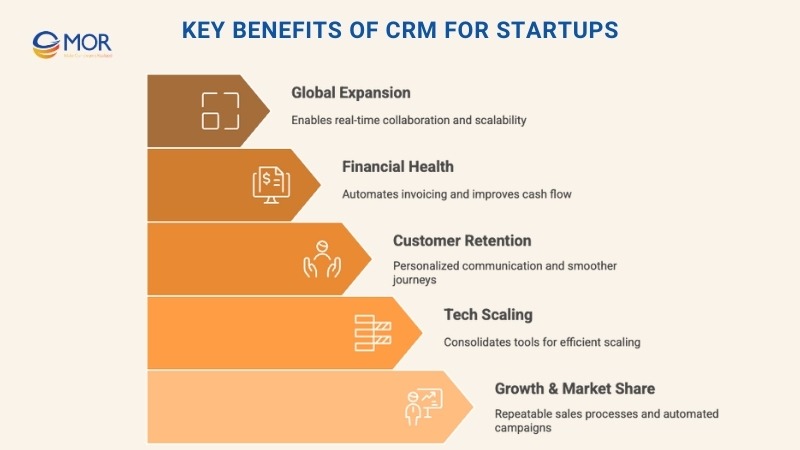
Driving Faster Growth And Higher Market Share
Regardless of whether your startup is fueled by crowdfunding, venture capital, business loans, or grants, building a strong foundation for growth is essential. One of the biggest advantages of using a CRM for startups is the ability to accelerate both revenue and market share from the very beginning.
For early-stage founders, revenue growth is the clearest sign that your product resonates with customers. When sales scale steadily, it proves people are moving from simple interest to actual conversions.
According to the Startup Enterprise GTM Report by Salesforce Ventures, many successful founders remain actively involved in enterprise sales until reaching around $5M ARR. This highlights just how critical structured processes are during the early stages.
A CRM for startup teams makes this journey more manageable, even if you don’t have a professional background in sales or marketing. The right system helps you establish repeatable workflows, monitor engagement, and run campaigns that generate consistent results.
Some practical ways CRM tools for startups can fuel faster growth include:
- Identifying precise audience segments such as demographics, location, and average spending habits
- Building outreach sequences with automated follow-ups
- Tracking how prospects interact with your website, social media, and email channels
- Generating advanced reports and analytics that guide smarter business decisions
Scaling Quickly With The Right Tech Stack
Reaching the stage where you’re ready to scale is exciting, but the question is whether your technology can grow alongside you. A scattered tech stack often creates overlap, wasted spending, and unnecessary complexity.
The smarter approach is to view your digital infrastructure as a single toolbox where every tool serves a clear purpose, integrates smoothly, and adds measurable value.
A modern CRM for startups consolidates many essential capabilities into one ecosystem. Instead of juggling multiple apps for marketing, customer service, and sales, you can rely on a unified platform that saves time, reduces costs, and maintains agility during periods of rapid growth.
Take Salesforce’s Starter Suite and Pro Suite as examples. These solutions were designed with small businesses in mind, giving founders access to automation that can manage rising sales volumes, growing customer service requests, and more ambitious marketing campaigns.
The interfaces are quick to set up, intuitive to navigate, and flexible enough to support fast-moving teams.
For companies comparing different CRM options for startups, both Starter and Pro provide affordable packages that combine sales, service, marketing, and commerce tools. Starter makes it easy to begin with a simple setup, while Pro includes everything in Starter along with customization, automation, and advanced analytics to support long-term scaling.
Winning And Keeping More Customers
Today’s buyers expect companies to keep up with their evolving needs. In fact, research shows that nearly two-thirds of customers want businesses to personalize interactions and adapt experiences based on changing preferences.
A well-implemented CRM for startups allows you to do exactly that, strengthening relationships and building trust from the very first touchpoint.
With detailed customer profiles stored in your system, you can easily track lifetime value, predict future purchases, and monitor activity such as app visits or email engagement. This level of visibility helps you deliver the right message at the right time, turning casual interactions into meaningful connections.
Equally important, a CRM tool ensures smooth collaboration between teams. Leads generated by marketing can be handed over seamlessly to sales, reducing friction and improving the customer journey. When customers experience consistent support across all touchpoints, they are far more likely to remain loyal.
This combination of personalization and team alignment not only keeps customers happy but also encourages repeat purchases and positive referrals. Over time, these satisfied buyers become advocates who fuel organic growth for your startup.
Boosting Financial Health And Operational Efficiency
For early-stage businesses, maintaining financial stability is just as important as generating revenue.
A CRM for startups helps extend runway, manage working capital more effectively, and lower the overall burn rate, which is often critical in the first few years of operation. By tightening financial processes, you set a stronger foundation for sustainable growth.
On the operations side, automation plays a key role. With built-in workflows, you can reduce manual tasks, allocate resources more strategically, and lower the cost of serving each customer. These improvements don’t just save money, they also enhance customer experiences at every step.
Here are several ways a CRM software for startups strengthens both cash flow and efficiency:
- Shorten the sales cycle by automating lead management, follow-ups, and nurturing, allowing sales reps to focus on top opportunities
- Run smarter marketing campaigns using personalized, automated emails that guide prospects through the funnel
- Speed up payments by creating invoices, embedding payment links, and tracking collections directly inside the system
- Enhance lead-to-cash processes through predictive analytics that anticipate customer behavior and sales performance
Expanding Into Global Markets
Growth rarely stops at the local level. As your business explores opportunities overseas, a centralized CRM for startup companies ensures teams can collaborate across borders without friction. Whether your employees are in different time zones or departments, everyone has access to the same customer data and insights in real time.
This connectivity makes it easier to coordinate marketing campaigns, manage international sales pipelines, and maintain consistent service standards worldwide.
For founders aiming to reach a global customer base, adopting one of the top CRM platforms provides both the scalability and the transparency needed to succeed internationally.
What Can Startups Do With A CRM?
A modern CRM for startups equips young companies with the tools they need to overcome early challenges, scale operations quickly, and strengthen connections with both new and existing customers. By using the system strategically, founders can build processes that support growth while keeping teams aligned around the same goals.
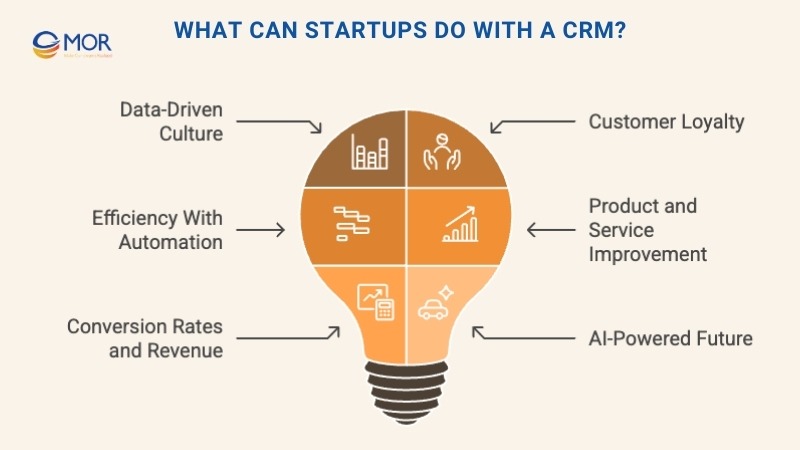
Building A Data-Driven Culture
One of the biggest hurdles for early businesses is managing fragmented information. Data silos occur when critical insights are stored in separate apps or departments, making them invisible to the rest of the organization.
For example, your marketing team may track responses to an email campaign, but if the sales team cannot see that data, opportunities are lost and efficiency drops.
These silos become even more problematic as your team and technology stack grow, often leading to wasted resources and duplicated efforts. In fact, recent research found that over 80% of IT leaders believe siloed data slows down digital transformation efforts.
Implementing a CRM tool solves this by centralizing data from multiple sources into a single, accessible platform. With every department working from the same information, your team gains complete visibility into customer journeys and internal performance.
Beyond centralization, built-in analytics make it easier to interpret patterns and respond quickly. If revenue is climbing but new customer conversions are declining, a CRM for startup leaders will highlight that discrepancy, signaling the need to refine marketing outreach or explore new acquisition channels.
This approach ensures decisions are guided by real insights rather than guesswork.
Strengthening Customer Loyalty
Investing in a CRM for startups early on helps create strong relationships that last a lifetime. Research from the 2024 Salesforce Customer Success Metrics Global Highlights shows that small businesses using Salesforce achieved a 42% boost in customer satisfaction and a 41% rise in customer retention.
These results highlight how powerful customer relationship management can be for young companies.
To replicate this success, you need to anticipate customer needs and resolve potential issues before they escalate. A reliable CRM for startup companies supports loyalty-building by offering:
- Convenient self-service options that give customers control
- Complete timelines of interactions across channels
- Personalized, data-driven automation that keeps communication relevant
When your customers feel understood and supported at every stage, they’re more likely to return and recommend your brand to others.
Increasing Efficiency With Automation And AI
Most of today’s CRM programs are equipped with automation and AI features that eliminate repetitive, time-consuming tasks. Instead of wasting hours on manual data entry, your team can focus on meaningful work like closing deals and improving customer experiences.
For example, AI can automatically log and transcribe sales calls, sync contacts, update events, and record emails directly into the system. These enhancements not only streamline operations but also provide more accurate data, ensuring your startup makes smarter decisions and maintains a competitive edge.
Using Feedback To Improve Product And Service Design
Understanding what customers truly think about your brand is key to shaping better offerings. A CRM for startups captures valuable insights about how people interact with your products and services, allowing you to identify trends and refine your strategy. With this knowledge, you can stand out in competitive markets and adapt quickly to shifting demands.
The system helps analyze different types of feedback, such as:
- Features customers appreciate or dislike
- Suggestions that could improve the product
- Factors that might cause them to switch brands or stop buying altogether
By paying attention to this feedback inside a CRM tool, startups can innovate more effectively and build solutions that resonate with their target audience.
Raising Conversion Rates And Revenue
Another major benefit of adopting a CRM software for startups is the ability to lift conversion rates and increase revenue. By combining sales, marketing, and service tools into one platform, it becomes easier to engage buyers, enhance productivity, and accelerate deal closures.
The most successful companies focus on:
- Prioritizing high-impact opportunities and sales activities
- Anticipating customer needs with real-time insights
- Tracking the entire sales pipeline with full visibility
- Staying aligned with goals through detailed performance monitoring
This structured approach ensures that your team uses its energy where it matters most, leading to higher conversion rates and stronger financial results.
Preparing For An AI-Powered Future
The combination of AI and a CRM for startups has the potential to transform how young companies operate. Artificial intelligence can uncover hidden trends in customer data, identify new ways to connect with prospects, generate tailored content, and deliver highly personalized marketing campaigns. This makes it easier for growing businesses to compete effectively in fast-moving markets.
Insights from the Small Business Trends Report show that startups using AI experience benefits ranging from improved forecasting accuracy to stronger competitive analysis. In fact, 85% of small business leaders reported noticeable improvements in how their sales teams manage time with the help of AI.
Generative AI is opening even greater possibilities. According to recent research, 64% of small business employees believe generative AI can improve operational efficiency, while 62% expect it to elevate customer service. These figures prove that integrating AI into a CRM for startup companies is no longer optional but a practical step toward sustainable growth.
Equally important, CRM platforms provide the structured data environment that AI needs to function effectively.
With features such as advanced access controls, audit trails, and compliance support for data protection regulations, startups can organize information securely and responsibly. By maintaining clean, well-governed data, you prepare your business to adopt trusted AI-powered solutions that will shape the future of your operations.
Top 13 CRM For Startups In 2026
With so many platforms available, it can be difficult to decide which one is right for your business. To make it easier, we’ve gathered the top CRM for startups in 2026 that combine affordability, scalability, and powerful features to support growth.
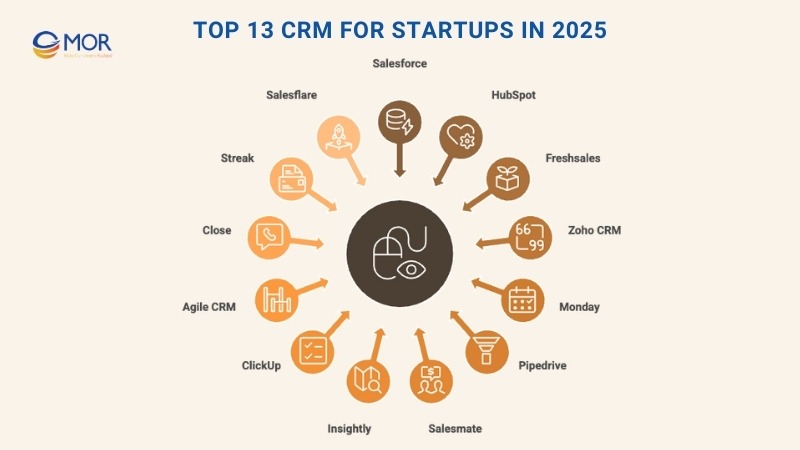
1. Salesforce
Salesforce is one of the most established names in the CRM market, offering an extensive set of features, open APIs, and a powerful AppExchange marketplace. Its scalability makes it suitable for startups as well as larger enterprises, which is why it’s often ranked among the best CRM for startups.
With Salesforce, you can manage everything from contact and sales pipelines to marketing campaigns within a single system. The platform also integrates with hundreds of third-party applications, making it one of the most flexible and comprehensive CRM software for startups available today.
Pros
- User-friendly once set up, making it a strong option for growing teams that want independence in managing the platform
- A wide variety of features and plugins that can be customized to track even complex customer data
- Backed by Salesforce’s long history and reputation for innovation
Cons
- Initial setup and customization can be time-consuming, especially for non-technical teams
- The user interface may feel overwhelming for beginners without CRM experience
- Ongoing costs can be high for startups with limited budgets
Notable Features
- Customizable dashboards and reports
- Lead generation and qualification tools
- Campaign creation and management
- Advanced lead filtering and tracking
- Interaction tracking across channels
- Mobile app and API integrations for seamless workflows
Pricing
- Essentials: $25 per user/month
- Professional: $75 per user/month
- Enterprise: $150 per user/month
- Unlimited: $300 per user/month
2. HubSpot
HubSpot is one of the most popular choices among startups, especially because it offers a free plan packed with essential tools. This makes it a top option for founders looking for the best CRM for a startup without committing to large upfront costs.
The platform features an intuitive interface and provides a single place to manage contacts, track leads, and oversee sales activities. You can also build custom reports to get detailed insights and monitor performance. Since HubSpot is mobile-friendly, your team can access the system anytime, anywhere.
Pros
- Free forever plan for basic use
- Browser extension for easy integration with workflows
- Strong professional plan with advanced lead generation tools
- Excellent email integration and contact importing
- Clean, user-friendly interface with smooth navigation
Cons
- Free plan comes with limited functionality compared to paid tiers
- Managing different HubSpot hubs can feel complex as your needs expand
- Enterprise-level pricing can be expensive for smaller teams
Notable Features
- Lead and prospect tracking
- Email and phone call monitoring
- Social media activity measurement
- Website traffic and visit analysis
- Marketing campaign tracking
- Sales activity reporting and analytics
Pricing
- Free Sales CRM Tools: $0
- Sales Hub:
- Starter: $45/month for two users ($23 per additional user/month)
- Professional: $450/month for five users ($90 per additional user/month)
- Enterprise: $1,200/month for 10 users ($120 per additional user/month)
3. Freshsales
Another CRM for startups is Freshsales. This app is a sales-focused CRM that helps startups accelerate deal cycles, personalize customer engagement, and increase overall revenue. The platform is designed to give teams a complete 360-degree view of each customer, showing every interaction in one place.
This data-driven approach makes it easier to deliver tailored experiences while maintaining a streamlined sales process.
With Freshsales, startups can prioritize high-quality leads, create stronger opportunities, and close deals faster by engaging prospects in the right context of their buying journey. This makes it an attractive option for those seeking the best CRM for SaaS startups where efficiency and personalization are both essential.
Pros
- Provides a clear view of customer accounts and ongoing sales processes
- Strong documentation and responsive support for users
- Useful for planning, tracking, auditing, and selling in one unified platform
- Enables cross-sell and upsell campaigns with automated workflows
- AI-powered insights enhance conversion rates and help close deals faster
Cons
- Limited sales sequence features compared to some competitors
- Lacks deep integrations with popular email services like Gmail
- Search function does not currently support keyword-based queries
Notable Features
- AI-powered chatbots for real-time interactions
- Visitor tracking to analyze behavior and intent
- Contact scoring to highlight the most promising leads
- Multi-channel communication via email, chat, SMS, and phone
- Dynamic revenue forecasting to strengthen financial planning
Pricing (Billed Annually)
- Free: $0
- Growth: $15/user/month
- Pro: $39/user/month
- Enterprise: $69/user/month
4. Zoho CRM
Zoho CRM is a versatile customer relationship management platform that is especially valuable for customer-facing teams. It comes with powerful analytics, advanced automation, and customization options that simplify and optimize the sales process.
With Zoho, startups can strengthen relationships, connect with customers through the right channels, and deliver personalized communication at the right moment to drive better results.
For founders searching for a cost-effective solution, Zoho stands out as one of the most cheap CRM options on the market. It combines affordability with a wide feature set, making it a strong competitor for businesses that want scalability without high upfront investment.
Pros
- Budget-friendly pricing options suitable for all business sizes
- Can be set up without requiring dedicated technical staff
- Strong integration with the full Zoho suite of products
- Easy to deploy, scale, and customize based on needs
- Offers an extensive developer platform for tailored solutions
Cons
- The interface can feel outdated compared to competitors
- Community resources are smaller compared to platforms like Salesforce
- Limited in-depth tutorial content for onboarding new users
Notable Features
- Comprehensive analytics tools for data-driven decision-making
- Dedicated administrative control panel
- High-level customization options
- Integration with 500+ third-party applications via Zoho Marketplace
- Specialized programs for training, deployment, and migration support
Pricing (Billed Monthly)
- Standard: $20/user/month
- Professional: $35/user/month
- Enterprise: $50/user/month
- Ultimate: $65/user/month
5. Monday
The Monday Sales CRM is a flexible and user-friendly customer relationship management platform that helps startups gain full visibility into their sales pipeline while boosting team productivity.
Designed with simplicity in mind, it allows founders to manage customers, track deals, and improve collaboration all in one place. This makes Monday a strong contender when evaluating the best CRM for startup companies that need both clarity and efficiency.
One of its biggest advantages is customization. You can easily adapt the platform to your sales cycle, tailoring everything from workflows to dashboards. Monday also supports central client communication through email integrations, third-party app connections, and real-time dashboards that clearly show what’s happening at each stage of the sales process.
Pros
- Large template library for quick setup using proven layouts
- Highly customizable to suit your unique business needs
- Clean and intuitive user interface that’s easy to navigate
- Simple customer tracking tools that enhance team efficiency
Cons
- Some advanced features require upgrading to higher pricing tiers
- The interface can slow down when managing large amounts of data
- Reporting tools could be more detailed and robust
Notable Features
- Strong visibility into the sales pipeline
- Fully customizable workflows for the sales cycle
- Integrated client communication center with email sync
- Real-time deal tracking for complete visibility
- Custom dashboards that are visually appealing and easy to build
Pricing
- Individual CRM: $0
- Basic CRM: $10/seat/month
- Standard CRM: $14/seat/month
- Pro CRM: $24/seat/month
- Enterprise CRM: Custom pricing
6. Pipedrive
Pipedrive is one of the best CRM for startups. This solution is a cloud-based platform built to help businesses manage customer relationships more effectively. It centralizes customer data and offers a wide range of features designed to improve sales interactions, making it an excellent choice for startups looking for a simple yet powerful solution.
For founders comparing CRM tools for startups, Pipedrive stands out for its ease of use and focus on practical sales management.
Pros
- Built-in call tracking and lead management
- Strong sales and workflow automation capabilities
- Responsive and helpful customer support
- Designed by sales professionals with real-world experience
Cons
- Limited analytics compared to more advanced competitors
Notable Features
- To-do list creation for better process management
- Intuitive drag-and-drop interface
- Sales data importing and deal tracking
- Account management tools
- Sales forecasting for more accurate planning
Pricing
- Essential: $18/user/month
- Advanced: $33/user/month
- Professional: $59/user/month
- Enterprise: $119/user/month
7. Salesmate
Salesmate is a customer relationship management and automation platform designed to deliver personalized, productive experiences for both sales teams and customers. Trusted by more than 4,000 sales teams across 70 countries, it helps startups grow revenue, close more deals, and improve customer satisfaction.
Salesmate offers prospect and lead management, pipeline tracking, sales activity monitoring, automation sequences, reporting, and deep integrations with a wide range of third-party tools. For early-stage businesses searching for one of the best CRM systems that balances affordability with functionality, Salesmate is a strong contender.
Pros
- Cost-effective option for smaller teams compared to other CRM solutions
- Quickly boosts productivity for sales representatives
- Integrates email, SMS, phone, and other communication channels in one system
- Visual pipeline tools make tracking deals simple and intuitive
- Reliable, responsive customer support team
Cons
- Report formatting can be hard to interpret at times
- The “deals” page layout could be more user-friendly
- SMS delivery works best under 160 characters
- Learning the platform’s many features can feel overwhelming initially
Notable Features
- Bulk email and SMS campaigns with tracking, plus a built-in power dialer
- Complete sales pipeline visualization with activity tracking
- Sales forecasting, custom reports, and tailored dashboards
- Integration with 700+ business apps including Google Workspace, Microsoft, and Zapier
- Collaboration features to keep teams aligned
Pricing (Billed Monthly)
- Starter: $15/user/month
- Growth: $30/user/month
- Boost: $50/user/month
- Enterprise: Custom pricing
8. Insightly
Insightly is one of the best CRM for startups that is modern and scalable, built to support startups as they grow. It’s simple to set up, integrates seamlessly with a wide variety of third-party tools, and provides everything sales teams need to stay organized and productive.
For businesses searching for a reliable CRM for startup companies, Insightly offers a clean, user-friendly design with the flexibility to expand as your needs evolve.
With Insightly, your business can centralize customer data, gain actionable insights to close deals faster, and design engaging customer journeys. It also enables you to convert deals into projects, ensure timely delivery, strengthen customer support, and consistently exceed expectations.
By keeping all teams aligned on one platform, Insightly makes scaling smoother and more efficient.
Pros
- Strong feature set that supports diverse sales workflows
- Reliable documentation from lead capture through project completion
- Minimalist and easy-to-navigate user interface
- Wide range of integrations with commonly used business tools
- Highly customizable and scalable for companies of any size
Cons
- Broad feature set can be complex to configure initially
- Does not include built-in time-tracking
- Chrome extension can feel clunky at times
- Project management tools are limited in depth
Notable Features
- Build personalized customer journeys to attract and convert leads
- Run A/B and multivariate testing for campaigns
- Customer support portal for better service management
- Advanced analytics for tracking customer health and performance
- Fast time-to-value with streamlined setup
Pricing
- Plus: $29/user/month
- Professional: $49/user/month
- Enterprise: $99/user/month
9. ClickUp
ClickUp is widely recognized as one of the top CRMs choices for startups that place a strong emphasis on project management.
It allows teams to visualize their sales pipelines and organizational workflows through intuitive dashboards, clear data, and attractive graphics. With ClickUp, startups gain not only a CRM but also a productivity hub where sales, customer management, and collaboration come together.
Your company can centralize client information, streamline account management, and improve communication by adopting ClickUp. The platform supports sales pipelines, feedback collection, and task tracking, ensuring that no customer detail is overlooked and every project is aligned.
Pros
- Great tool for capturing and organizing client feedback
- Ideal for marketing teams to keep campaigns and projects in sync
- Provides an all-in-one solution that covers multiple business needs
- Easier to use compared to more technical tools like Jira
- Built-in employee and time-tracking capabilities
Cons
- Fonts and text themes can be harder to read on certain pages
- Subtasks don’t appear on the homepage, requiring extra clicks
- Gantt chart functionality has a learning curve
Notable Features
- Intuitive CRM views to see all client orders at a glance
- High-level data analysis for actionable customer insights
- Over 50 dashboard widgets for customizable reporting and visuals
- Centralized customer outreach through an integrated email hub
- Automation and forms to easily collect and manage account data
Pricing (Billed Monthly)
- Free: $0
- Unlimited: $9/user/month
- Business: $19/user/month
- Business Plus: $29/user/month
- Enterprise: Custom pricing
10. Agile CRM
Agile CRM is a cloud-based platform that combines sales enablement, customer service, and marketing automation into one streamlined solution.
Trusted by more than 15,000 businesses worldwide, Agile CRM helps startups grow revenue, strengthen customer relationships, and close deals faster. As one of the most versatile CRM programs available, it offers everything early-stage companies need to manage sales, service, and marketing from a single interface.
The platform is built for speed, simplicity, and mobility. With Agile CRM, users can manage contacts, schedule appointments, handle telephony, oversee projects, and even use gamification to motivate teams. This makes it a powerful option for startups that want an “all-in-one” system to support long-term growth.
Pros
- Great choice for businesses seeking an all-in-one CRM platform
- Strong marketing and tracking capabilities
- Extensive support documentation for onboarding new users
- Ideal for managing marketing, sales, and reporting together
- Easy to view processes and logged customer interactions
Cons
- Subscription cancellations may require direct contact with customer support
- Automation documentation could be more detailed and up to date
- Limited integrations with niche or specialized APIs
Notable Features
- Quick setup and affordable pricing compared to alternatives
- Marketing tools like landing page builder, automation, email campaigns, mobile marketing, and email tracking
- Customer service tools including ticketing, feedback, canned responses, helpdesk, and knowledge base
- Integrations with widely used apps like Google Workspace, Facebook, Twitter, RingCentral, LinkedIn, and Twilio
Pricing (Billed Monthly)
- Free: $0
- Starter: $14.99/user/month
- Regular: $49.99/user/month
- Enterprise: $79.99/user/month
11. Close
Close is a CRM platform designed specifically for startups that are scaling quickly. It’s easy to set up, simple to navigate, and built to let teams spend less time figuring out software and more time building meaningful customer relationships.
For founders searching for the best CRM for startups, Close delivers a streamlined experience that balances usability with powerful automation.
The platform supports key automations such as email campaigns, call logging, and lead tracking, all of which help startups save time and stay organized. With more than 6,500 fast-growing businesses already using it, Close has proven itself as a reliable option for early-stage companies looking to stay agile while expanding.
Pros
- Quick setup process with easy lead importing
- Intuitive dashboard without a steep learning curve
- API integrations with popular apps and platforms
- Free trial available for testing within your workflow
- Unlimited contacts included in most plans
Cons
- Free trial is limited to just two weeks
- SMS features are restricted to certain countries
- Additional costs apply for SMS functionality
Notable Features
- Automated email marketing for consistent outreach
- Call recording to capture feedback and evaluate performance
- Smooth call transfers for a better user experience
- High-quality audio for professional communications
- Automated calling and logging to keep all contacts organized in the CRM
Pricing
- Startup: $49/month
- Professional: $299/month
- Enterprise: $699/month
12. Streak
Streak is a Gmail-based CRM that brings customer relationship management directly into your inbox. Designed for teams that rely heavily on email, Streak offers strong tools for email marketing, business development, project management, and asset management.
Because it operates inside Google Workspace, it integrates seamlessly with Gmail and other Google tools, making it one of the most convenient CRM options for startups that primarily use Google’s ecosystem.
It’s important to note that Streak is limited to Gmail, which makes it less effective for companies that want to expand their strategies beyond email into areas like calling or advanced multichannel marketing.
Pros
- Excellent tool for managing email marketing campaigns
- Built-in project management tools for keeping teams organized
- Thread splitter to manage incorrectly merged conversations
- Delayed sending and scheduling features for emails
- Integration with multiple apps plus API access
Cons
- Restricted to Google Workspace, limiting broader functionality
- Reporting features are only available on higher-tier plans
- Limited scope outside of email marketing
Notable Features
- Business development tools to strengthen customer and partner relationships
- Project management features to keep teams accountable
- Customizable templates and pipelines for flexibility
- Mail merge for bulk email campaigns
- Snooze and send-later functionality with notifications before emails are sent
Pricing
- Free: $0
- Streak Solo: $19/user/month
- Streak Pro: $59/user/month
- Streak Enterprise: $159/user/month
13. Salesflare
Salesflare is a collaborative CRM designed for small and mid-sized businesses, with a particular focus on B2B sales teams. It encourages teamwork through automated features and integrations with platforms like Gmail, Microsoft, and LinkedIn.
Streamlining workflows and reducing manual data entry, Salesflare helps startups stay productive and efficient. For companies looking for a specialized CRM for startups growth in the B2B space, Salesflare is a strong option.
That said, its focus on B2B sales means it may not be the best fit for every sales team or business model.
Pros
- Seamless integration with LinkedIn, Gmail, and other popular platforms
- Email-finding credits included with all plans
- Customizable dashboards on higher-tier plans
- Free trial available for testing in real workflows
- Onboarding and training support provided
Cons
- No free plan available for long-term use
- Lower-cost plans come with limited features
- Primarily tailored for B2B use cases
Notable Features
- Automated address book that gathers and updates customer data
- Automatic meeting and call logs for improved collaboration
- Organized document management tied to each customer
- Personalized email campaign capabilities
- Email-finding credits available across all subscriptions
Pricing
- Growth: $29/user/month
- Pro: $49/user/month
- Enterprise: $99/user/month
Which Types Of CRM Are Best For Startups?
The best CRM for startups is one that helps you grow quickly while keeping things simple in the early stages. But how do you know if a platform will scale with you? Below are seven important qualities to look for when choosing the right solution.
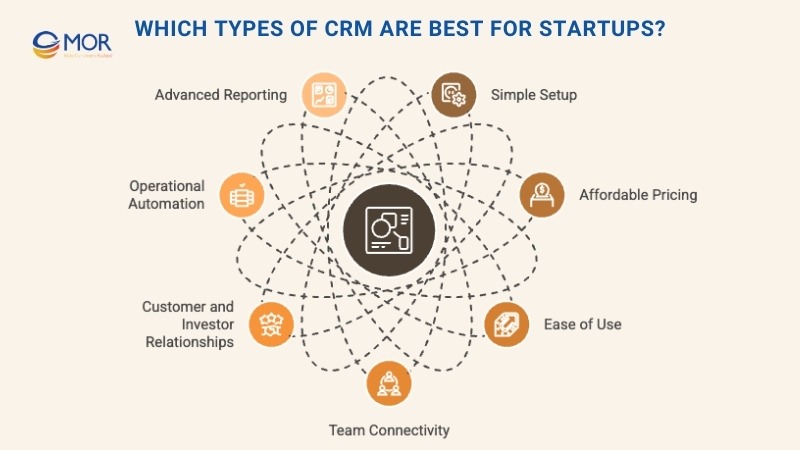
Simple Setup With Room To Scale
For founders just getting started with CRM, simplicity matters. The platform should provide an easy-to-use interface, clear guidance, and features that are intuitive enough for first-time users. At the same time, it should also have the flexibility to evolve as your business grows beyond the startup phase.
As your company expands, your startup CRM should let you:
- Customize features to fit unique workflows
- Add more advanced automation when needed
- Seamlessly integrate third-party apps directly into your system
This combination of simplicity and scalability ensures you don’t outgrow your CRM too quickly, making it a long-term asset rather than a short-term fix.
Affordable Plans For Early-Stage Companies
A common misconception is that CRM is only for large enterprises. In reality, there are plenty of CRM options for startups that are affordable and designed specifically for small teams.
The best solutions offer cost-effective plans with essential tools for sales, marketing, and customer service, often with free trials so you can test them before committing.
For instance, Salesforce provides enterprise-level platforms, but their Starter Suite and Pro Suite are built with startups in mind. These affordable packages combine sales, service, marketing, and commerce features into a single platform while offering a free trial to help you get started without financial risk.
Easy Implementation And Usability
Startups need to see results quickly, so the right CRM for startups should be simple to set up and require no developer expertise. A good system will help your team get started immediately while providing the essentials to keep momentum going. Look for solutions that are:
- Intuitive and easy to navigate
- Capable of importing data without complications
- Supported by accessible training resources and reliable customer service
This ensures that even non-technical teams can get the system running smoothly from day one.
Keeping Teams Connected
Collaboration is critical for growth, and the best CRM for a startup should make it easy for every department to connect and share insights. Whether team members are in sales, marketing, or customer service, the platform should provide seamless communication and a single source of truth, regardless of role or location.
Strengthening Customer And Investor Relationships
A strong CRM tool helps transform one-time buyers into long-term advocates by giving you visibility into the full customer journey, from first contact through repeat purchases. With this insight, you can personalize interactions and foster loyalty more effectively.
Beyond customers, CRM is also valuable for investor relations. By organizing interactions with venture capital firms, partners, and stakeholders, startups can maintain stronger connections, manage ongoing communications, and ensure transparency, key factors when seeking funding or nurturing partnerships.
Streamlining Daily Operations
An effective CRM for startups should optimize operations across the entire customer journey. Automation is a crucial component here, helping reduce repetitive manual tasks and freeing teams to focus on higher-value work. From sales follow-ups to customer service requests, automation ensures that every department runs more smoothly and consistently.
Analyzing Performance With Reporting And Insights
The best CRM software for startups goes beyond contact management by offering advanced reporting and analytics tools. These features allow founders to evaluate business health, identify performance gaps, and make smarter decisions.
Modern CRMs often include data-mining capabilities to capture and analyze information from multiple sources, along with segmentation tools that classify leads and customers by demographics, engagement level, and buying behavior. This makes it easier to spot opportunities, refine strategies, and track progress toward business goals.
How To Select The Best CRM For Startups?
With so many platforms available, it can be challenging to choose the right one that balances cost, functionality, and customization. To narrow your options, here are six practical steps to guide you toward the best CRM for startups.
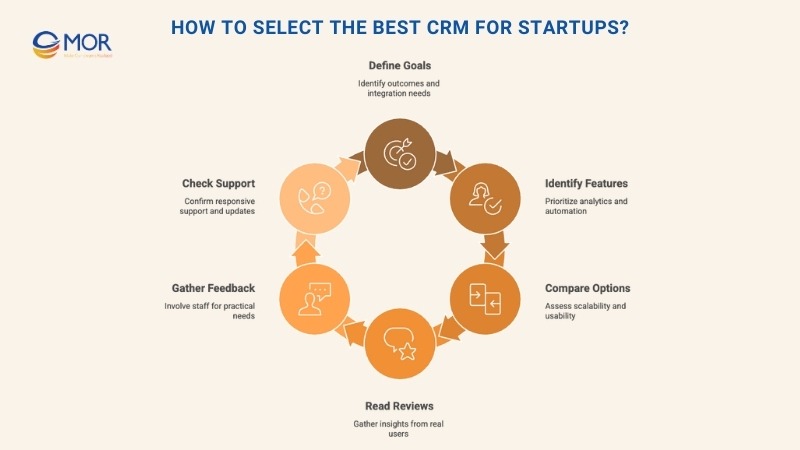
Define Your Goals
The first step is to determine exactly what you want to achieve with your CRM. What outcomes matter most, and what metrics will you use to measure success? For some businesses, this may mean building detailed customer profiles that drive smarter sales and marketing decisions.
In this case, you’ll want a platform that provides a 360-degree view of each customer and possibly AI-powered recommendations to guide engagement strategies.
It’s also important to evaluate your current tech stack. Make a list of the tools you already use, along with the features you’d like to add.
Then assess how a CRM for startup companies can fill in the gaps, eliminate redundant tools, and provide new capabilities your existing systems don’t offer. This clarity will help you select a platform that complements, rather than complicates, your operations.
Identify The Must-Have Features
Every startup has different priorities, so it’s important to define which features matter most for your team. Some CRM tools for startups excel at analytics, others focus on delivering an exceptional customer experience, and some are built with AI capabilities to drive automation and insights.
Ideally, you’ll want a system that balances all three. For example, Salesforce AI enables startups to analyze data more effectively, personalize customer interactions, and boost overall productivity, all within a single platform.
Compare Options Carefully
Once you know your priorities, take the time to compare several platforms side by side. Evaluate how each option aligns with your needs in terms of scalability, pricing, and usability.
As you review different CRM for startups solutions, ask questions like:
- Will this CRM scale with my business, or does it have limitations?
- What is the total cost of ownership, including setup and maintenance?
- Are there hidden fees or add-on costs to consider?
- How well does it integrate with my existing tools?
- Is the platform intuitive and easy for my team to adopt?
This process ensures you choose a solution that not only works today but also supports long-term growth.
Read Authentic Customer Reviews
After narrowing your list of options, take time to read customer reviews. Look for consistent patterns in user feedback, whether it’s about performance issues, hidden costs, or limited support.
Real-world experiences can reveal strengths and weaknesses that may not appear in product descriptions, helping you choose the best CRM for startups with greater confidence.
Gather Team Feedback
By now, you should have three or four platforms in consideration. At this stage, it’s essential to involve key stakeholders. For your CRM for startup adoption to succeed, your team needs to feel comfortable using the platform daily.
Be sure to include input from department leaders, IT managers, and frontline staff who will rely on the system. Their feedback can highlight practical needs and potential challenges you might have overlooked.
Check Provider Support And Updates
Before committing, confirm what level of service and support each provider offers. A reliable CRM software for startups should include on-demand customer support to resolve urgent issues quickly.
Equally important, the provider should continuously update the platform with new features and improvements so your system stays relevant as your business grows.
When Should Startups Invest In A CRM?
The ideal moment is right at the beginning. Introducing CRM in the early stages allows startups to work with accurate, organized data from day one and build reliable performance tracking.
Delaying the decision often makes things more complicated and expensive as the company grows. Choosing a CRM solution that can expand with your business saves you from the hassle of data migration and reduces the risk of losing valuable information later on.
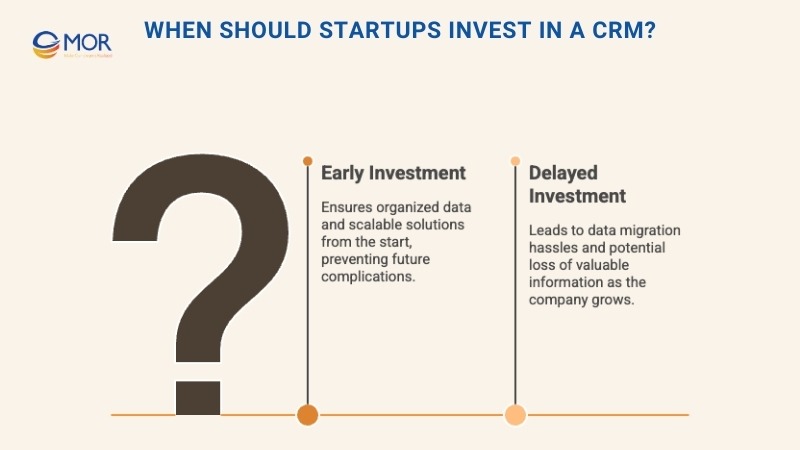
Partnering with MOR Software can make this transition much smoother. With proven experience in building and customizing CRM for startups, we help businesses implement scalable solutions from the very beginning, ensuring clean data management, seamless integration, and long-term growth support without costly migration issues later on.
Conclusion
Adopting the right CRM for startups is more than just a tech investment. It’s the foundation for sustainable growth. From organizing customer data and automating workflows to improving collaboration and scaling globally, the right platform empowers startups to compete smarter and grow faster. With so many CRM tools for startups available, the key is choosing one that aligns with your goals, budget, and long-term vision.
At MOR Software, we specialize in building and customizing CRM solutions tailored to the unique needs of startup companies. Our expertise ensures seamless integration, clean data management, and scalable systems that grow alongside your business. If you’re ready to accelerate growth with the best CRM, contact us today and let’s build a solution that drives your success in 2025 and beyond.
MOR SOFTWARE
Frequently Asked Questions (FAQs)
What is the best CRM for a startup business?
Some of the strongest CRM platforms for startups include:
- Salesforce – A powerful all-rounder suitable for scaling businesses.
- HubSpot CRM – A free option with excellent tools for small teams.
- Zoho CRM – Highly customizable, making it a flexible choice.
- Monday.com – Combines project management with CRM features.
- Insightly – Streamlines task automation and helps focus on long-term goals.
- Pipedrive – Known for being beginner-friendly with simple setup.
Does a startup need a CRM?
Startups can technically operate without a CRM, but growth becomes much harder. A CRM provides the structure to manage customer relationships, track leads, and plan sales strategies, all of which are essential for scaling effectively.
Is there a 100% free CRM?
Yes. HubSpot CRM offers a permanent free plan with no time limits. It consolidates customer data into one system and includes AI-assisted tools, making it far more efficient than relying on spreadsheets.
Is Google for startups free?
Google for Startups is a global initiative that provides eligible startups with free credits for Google Cloud services, along with access to tools and resources designed to accelerate growth.
Is Zoho CRM cheaper than Salesforce?
Yes. Zoho CRM is generally more budget-friendly than Salesforce. It delivers strong sales and marketing features while being easier to learn, making it especially appealing to small and mid-sized businesses.
Which CRM is best for beginners?
Some of the easiest CRMs for newcomers are:
- HubSpot CRM – Visual, drag-and-drop pipelines.
- Zoho CRM – Simple to customize.
- Streak CRM – Built directly into Gmail.
- Copper CRM – Google Workspace-friendly.
- Monday CRM – Combines CRM with workflow tools.
- Insightly CRM – Clear structure for small teams.
- Odoo CRM – Open-source flexibility.
- Pipedrive – Very straightforward to set up and use.
What is HubSpot for startups?
HubSpot for Startups is a dedicated program that gives early-stage companies access to discounted tools, resources, and educational content, including guides, templates, and reports tailored to startup needs.
Can I make my own CRM?
Yes, businesses can build a custom CRM system from scratch or modify an existing CRM to meet specific requirements. This approach is flexible but often requires more technical resources.
Do startups need ERP?
An ERP system can be valuable for startups experiencing fast growth. It centralizes data across departments, improves decision-making, and prevents inefficiencies as operations expand.
Is Zoho CRM really free?
Zoho does offer a free plan, but it’s capped at three users and includes only basic functions. To access automation, advanced analytics, and integrations, businesses usually need to upgrade to a paid tier.
Does Google have a free CRM?
No, Google does not create its own CRM software. However, many small businesses use Google Workspace tools like Gmail and Calendar as a simple workaround, though this setup is not sustainable for growing teams.
What is the cheapest CRM?
Some of the most affordable CRMs include:
- Less Annoying CRM – Low-cost and beginner-friendly.
- HubSpot – Free tier available.
- Capsule CRM – Budget-friendly with essential features.
- Zoho CRM – Flexible pricing with accessible plans.
- Freshsales – Affordable with strong sales tools.
- Pipedrive – Good value for ease of use.
- Nimble – Social-driven CRM for small teams.
- Agile CRM – Combines marketing, sales, and service tools in one.
Which cloud is best for startups?
Top cloud platforms for startups include:
- Microtica – Simplifies cloud automation.
- Amazon Web Services (AWS) – Widely adopted and scalable.
- Google Cloud Platform (GCP) – Great for AI and data-heavy projects.
- IBM Cloud – Strong enterprise capabilities.
- Microsoft Azure – Flexible and widely integrated.
- DigitalOcean – Developer-friendly and cost-effective.
- Vultr – Simple pricing for smaller teams.
- Heroku – Easy deployment for applications.
Is Google for Startups worth it?
Yes. Beyond free cloud credits, the program gives startups access to expert technical guidance, training, and scalable infrastructure support. This helps young businesses optimize costs and grow faster.
Can I put my business on Google for free?
Yes. Setting up a Google Business Profile is completely free. It allows companies to appear on Google Search and Maps, helping them reach local and global customers.
Rate this article
0
over 5.0 based on 0 reviews
Your rating on this news:
Name
*Email
*Write your comment
*Send your comment
1